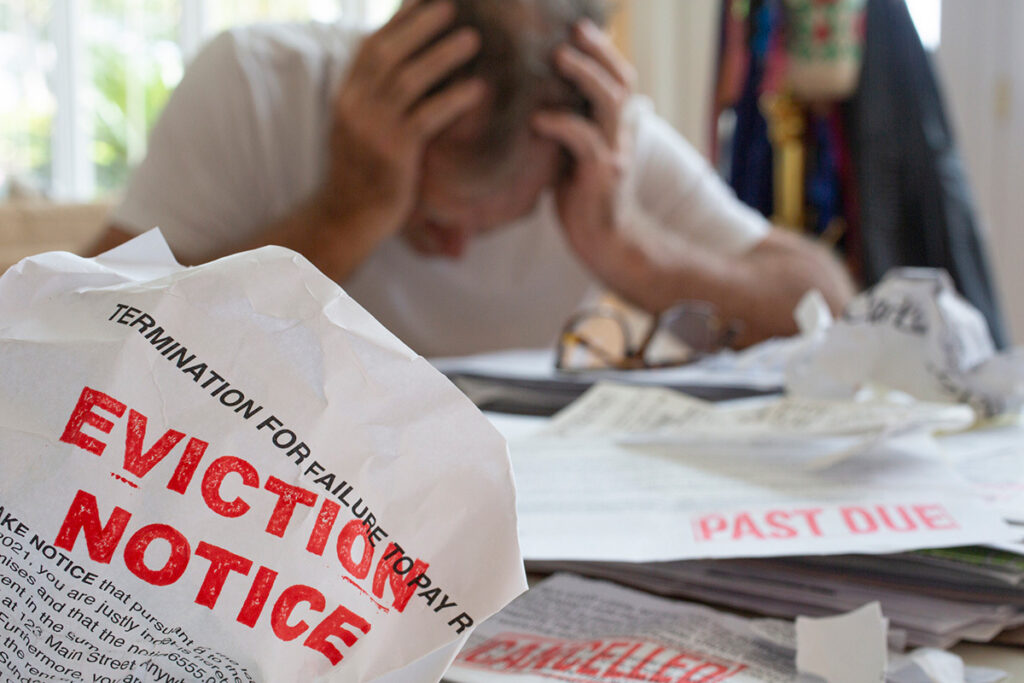Making Ends Meet: How to Cope with Financial Stress
We often tell our clients about financial stress: “Debt is something you have; it’s not who you are.” It’s a sentiment that begs repeating because of the overwhelming mental health issues worrying about money can cause.
The American Psychological Association (APA) reports that money is a volatile source of stress among 72% of U.S. adults. Name the subject and people worried about it–rent, the car, groceries, or daily living. The tension people experience related to money is typically connected with the absence of having it.
Financial stress is challenging to understand, manage and rectify. Discussing money and dealing with the headache it can cause forces anyone to face vulnerability. Financial concerns are everywhere because of economic instability, inflation, and a skyrocketing cost of living. Unfortunately, worry is all many people can afford to do.
With 78% of Americans living paycheck to paycheck, one emergency or unplanned expense can derail a household budget and create physical and mental health issues. Beyond Finance spoke with our financial experts about ways to tackle financial stress.
Understanding the Physical Issues of Financial Stress

In light of May being “Mental Health Awareness Month,” it’s important to know how financial stress can affect you emotionally and physically. Late collection calls, pink bills threatening your livelihood, and late fees in your checking account come with a price.
It’s also important to understand stress is a good sign because it means your body is working overtime to protect you from a threat. That automatic “fight-or-flight” response is also known as a “stress response.” Although the body’s response to stress is a good sign, it can reap bad results if financial stress gets out of control.
Dr. Howard E. LeWine, chief medical editor of Harvard Health Publishing, writes, “The carefully orchestrated yet near-instantaneous sequence of hormonal changes and physiological responses helps people fight off the threat or flee to safety. Unfortunately, the body can also overreact to stressors that are not life-threatening, such as traffic jams, work pressure, and family difficulties.”
What are the most common manifesting signs of financial stress*?
- Weight Fluxuation—Whether gaining or losing weight, appetite and anxiety are rarely a good mix. Some people “stress eat,” while others skip meals to save money.
- Internal Causes—When stress escalates, it can cause migraines, high blood pressure, acid reflux, or lead to something worse, like heart problems or diabetes.
- Social Problems—Struggling with money can cause others to dwell within and keep to themselves. Whether disguised by saving money or clouded by shame, this is usually one of the primary signs of financial stress.
- Anxious Symptoms—Not having enough money in between pay periods can cause severe anxiety. Those unpaid bills or necessities unable to purchase could start panic attacks, rapid heartbeats, lightheadedness, and body shakes.
- Sleeping Trouble—It seems many people have “tossed and turned” throughout the night, but worrying about the next time the phone rings or the mailman can develop into insomnia quickly.
Managing the Economic Issues of Financial Stress

Financial stress and anxiety don’t go away by only hoping it will. The economic issues must be resolved, but the emotional triggers need to subside to help any physical ailments that come with the worry.
When those aspects of financial stress are better contained, focusing on the monetary issues can happen more efficiently with a clearer mind, access to direction and the wherewithal to achieve a personal finance goal.
Here are a few ways to alleviate financial stress as the physical ailments lessen and allow for better peace of mind.
- Identify Sources—What are the most significant financial issues causing stress? Writing them down and revisiting that list helps create the finish line needed to reach an economic goal.
- Understand Cycles—Knowing how debt ebbs and flows could help create a solution to the ever-present debt. Read about snowball or avalanche payment methods and see what works.
- Examine Budgets—About 8 in 10 Americans say their overall debt is higher than a year ago. That could be the result of inflation or just mismanagement of income. Regardless, the budget should be questioned to determine what costs more and how to manage it.
- Create Buffers—Not having one is the most effective way to prevent a financial emergency. Of course, life will happen, and unplanned expenses will come up, but having an emergency fund is vital to alleviating stress. A simple payment to yourself each month will help that happen.
- Automate Payments—Setting up specific household bills on automatic payment can relieve financial stress and help you save money. Another automatic payment can be from your check to your savings account for a new emergency fund. You won’t spend it if you don’t miss it.
If you experience financial stress, emotional turmoil and physical symptoms, remember: you are not alone. Millions of people struggle with finances, but only a few know how to ask for help. Family, friends, or professional financial therapists will be there for you. Just ask.
*Sources: HelpGuide.org, Mayo Clinic, Harvard Medical Review
